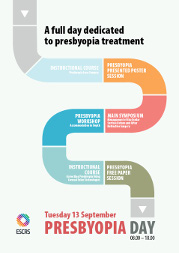Visual acuity and vision-related quality of life outcomes of cataract surgery in patients with a history of anxiety
Session Details
Session Title: Cataract Surgery Outcomes/Practice Styles/Biometry
Session Date/Time: Monday 12/09/2016 | 14:00-16:00
Paper Time: 14:24
Venue: Auditorium C6
First Author: : M.Daly USA
Co Author(s): : A. Payal L. Gonzalez-Gonzalez A. Chomsky D. Vollman M. Lawrence T. Cakiner-Egilmez
Abstract Details
Purpose:
To analyze visual acuity outcomes and functional visual improvement after cataract surgery in veterans who have anxiety.
Setting:
Retrospective analysis of deidentified data from the Ophthalmic Surgery Outcomes Data project from five Veterans Affairs Medical Centers in the United States.
Methods:
We analyzed 3154 cataract surgery cases from the Ophthalmic Surgical Outcomes Database (OSOD), comparing those without (Group A) and with anxiety (Group B – documented history of anxiety disorder, post-traumatic stress disorder (PTSD), or claustrophobia). All cases analyzed had completed both pre- and postoperative National Eye Institute-Visual Function Questionnaire (NEI-VFQ 25). The two groups were compared on best-corrected visual acuity (BCVA, logMAR scale) and all NEI-VFQ 25 subscales. Data were analyzed using analysis of variance and nonparametric tests. Correlation was estimated using Pearson’s correlation coefficient.
Results:
BCVA improved significantly from pre- to post-surgery in A (0.08 ± 0.23, P<.0001) and B (0.08 ± 0.24, P<.0001). The level of improvement was comparable in both groups (P=.32). Anxiety didn’t increase the risk of postoperative BCVA < 20/40 (A: 6.73% vs. B: 6.15%, OR 0.92, 95% CI 0.58 – 1.1, P=0.72).
VFQ composite scores increased significantly in A (84.02 ± 16.8, P<.0001) and B (80.26 ± 18.74, P<.0001). Improvement in VFQ composite scores was greater in B than A (P=.02). In both groups, improvement in BCVA correlated with improvement in VFQ composite scores (Group A-Pearson’s r =0.17; B r=0.16).
Conclusions:
Cataract surgery offers significant improvement in vision and vision-related quality of life (VRQoL) for eyes in both groups. The improvement in quality-of-life appears to be greater for Veterans with anxiety. Our findings merit further research and suggest cataract surgery for Veterans with anxiety should be prioritized by healthcare systems.
Financial Disclosure:
NONE





